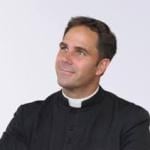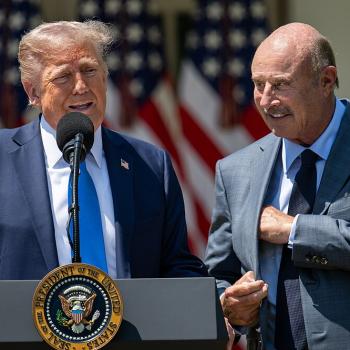In fact, your story is dramatic, because you grew up quite the opposite: You grew up as an anti-gay bigot, really.
When I was growing up, I was the biggest Bible-banging homophobe you've ever met. It was only when my three best friends all came out within a period of about three months -- that's when my whole world shifted. At first, I didn't behave well. I did what I thought any good Christian should do -- I ran away.
Then, later, I felt I had to go back and try to teach them something. I remember that in about fifteen seconds with my friends, I was spitting out all this stuff: "It's a sin! You're going to hell! You're going to get AIDS! You're going to do drugs! You're going to die!"
I unleashed this rant that surprised even me. I was surprised that all of this stuff was inside of me.
You write about this in your book. "What bothered me most about this was that I didn't even know where any of my homophobic thoughts originated."
My friends showed me way more grace than I deserved. They gave me a chance to go back and rethink all this stuff that I had bottled up inside of me.
Where did it come from? I don't remember my church specifically telling me all those things I ranted to them. My parents didn't tell me these things specifically. I'm just convinced that it's a general cultural knowledge that is passed down generation to generation. It's just a blatant given in conservative Christian circles.
Someone has got to start telling Christians something different than what I grew up picking up. When my friends came out, I realized that I didn't know what I'd been talking about. I felt that I needed to move into the neighborhood where they were headed and begin to learn.
This is the part of your story that's right out of Shane Claiborne's ministry. Shane preaches that people of faith shouldn't assume that they should go "do ministry" to "help" poor people. Shane argues that people of faith should go and live in diverse communities among poor people -- and they should start by spending a long time learning from poor people. Our goal is learning to live in diverse communities, Shane preaches. You're preaching the same thing, it seems to me, except that you're pointing people not toward poor people specifically -- but toward gay and lesbian people we've been ostracizing for so many years. Is it fair to compare your work to Shane's that way?
That's definitely fair. I love Shane's work. His life has been inspirational to me and I've been very fortunate to get to know him over the last couple of years. When people compare my work to Shane's, it's a huge compliment to me and I do look at it like that.
What we're talking about here really is the heart of your book.
Right. We can't look at gay and lesbian folks as a project, as an evangelism opportunity.
That's a chapter in your book: "We Are Not Your Project."
I'm saying that what we need to do now is to establish relationships with gay relatives, gay coworkers, gay friends, gay congregants -- it's the same principle Shane is talking about. We have to start by recognizing that people are people and we must build relationships to build a community. What Shane and I have in common is the teachings of Dr. John Perkins, founder of the Christian Community Development Association. Dr. Perkins teaches the "Three R's": Relocation, Reconciliation and Redistribution. I understand that not everyone is called to move into a gay neighborhood -- just like Shane doesn't teach that everyone is called to move into a poor neighborhood.
What you're describing represents a startling change of heart, mind, and spirit for a Pentecostal gay basher. You explain a couple of defining moments in your spiritual pilgrimage. One unfolded when your friends came out. Another defining moment was when you ran into your old high school baseball coach some years ago.
Right! I used to live for baseball. I went to college on a baseball scholarship and played Division 1 baseball. In high school, I broke a lot of school records. I was All Conference and All State. On and on. Anyway, years later, after I had started my organization, the Marin Foundation, I ran into my old high school coach. He said, "Hey, Andy! How're you doing!"
We were in a restaurant and I said, "Great to see you!" And I described this organization that builds bridges between the gay community and the conservative church. And he laughed at me! He thought that was so funny!
I was confused and asked him, "Jim, what's so funny?"
He said: "Do you remember who you used to be? Do you remember how you used to act in high school?"




